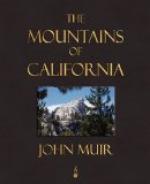There is always something deeply exciting, not only in the sounds of winds in the woods, which exert more or less influence over every mind, but in their varied waterlike flow as manifested by the movements of the trees, especially those of the conifers. By no other trees are they rendered so extensively and impressively visible, not even by the lordly tropic palms or tree-ferns responsive to the gentlest breeze. The waving of a forest of the giant Sequoias is indescribably impressive and sublime, but the pines seem to me the best interpreters of winds. They are mighty waving goldenrods, ever in tune, singing and writing wind-music all their long century lives. Little, however, of this noble tree-waving and tree-music will you see or hear in the strictly alpine portion of the forests. The burly Juniper, whose girth sometimes more than equals its height, is about as rigid as the rocks on which it grows. The slender lash-like sprays of the Dwarf Pine stream out in wavering ripples, but the tallest and slenderest are far too unyielding to wave even in the heaviest gales. They only shake in quick, short vibrations. The Hemlock Spruce, however, and the Mountain Pine, and some of the tallest thickets of the Two-leaved species bow in storms with considerable scope and gracefulness. But it is only in the lower and middle zones that the meeting of winds and woods is to be seen in all its grandeur.
One of the most beautiful and exhilarating storms I ever enjoyed in the Sierra occurred in December, 1874, when I happened to be exploring one of the tributary valleys of the Yuba River. The sky and the ground and the trees had been thoroughly rain-washed and were dry again. The day was intensely pure, one of those incomparable bits of California winter, warm and balmy and full of white sparkling sunshine, redolent of all the purest influences of the spring, and at the same time enlivened with one of the most bracing wind-storms conceivable. Instead of camping out, as I usually do, I then chanced to be stopping at the house of a friend. But when the storm began to sound, I lost no time in pushing out into the woods to enjoy it. For on such occasions Nature has always something rare to show us, and the danger to life and limb is hardly greater than one would experience crouching deprecatingly beneath a roof.
It was still early morning when I found myself fairly adrift. Delicious sunshine came pouring over the hills, lighting the tops of the pines, and setting free a steam of summery fragrance that contrasted strangely with the wild tones of the storm. The air was mottled with pine-tassels and bright green plumes, that went flashing past in the sunlight like birds pursued. But there was not the slightest dustiness, nothing less pure than leaves, and ripe pollen, and flecks of withered bracken and moss. I heard trees falling for hours at the rate of one every two or three minutes; some uprooted, partly on account of the loose, water-soaked condition of the ground;




